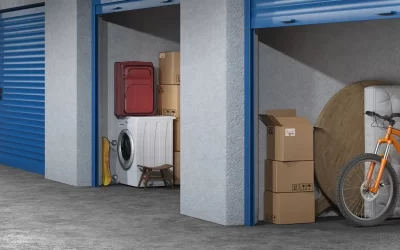Packing up your home—whether you’re moving, downsizing, renovating, or just trying to declutter—can feel overwhelming. From fragile items and bulky furniture to clothing and keepsakes, making sure everything is packed and stored properly is key to protecting your belongings and making the process less stressful. Whether you’re planning to use a storage unit short-term or long-term, these expert tips for packing and storing household goods will help you stay organized, save space, and keep your items in great condition.
Start with a Plan
Before you start throwing things into boxes, take a little time to plan. Go room by room and get an idea of what you’re storing — if you want to be extra thorough, maybe even create an inventory of the items you want to store. Decide which items you’ll need access to and which ones can go to the back of the unit. This helps you stay organized during the packing process and makes it easier to find things later.
Be honest about what you really need to keep. If you’re using this opportunity to declutter, separate items into donate, toss, and store categories. You’ll save space, effort, and money by not packing and paying to store things you no longer want. Future you will thank you!
Use High-Quality Packing Materials
Investing in good boxes and packing supplies pays off. Weak or damaged boxes can collapse, putting your items at risk. Use sturdy boxes of uniform size so they stack easily and safely. You’ll also want packing tape, bubble wrap, packing paper, and markers for labeling. For delicate items, avoid using newspaper, which can leave ink marks, and opt for clean paper or foam sheets instead.
You can even take this a step further an invest in clear plastic storage bins to pack your items in, which will have the added benefit of allowing you to see the contents of each box without having to open them. Plastic bins with secure lids are great for long-term storage or areas prone to humidity. They’re especially useful for storing clothes, documents, and electronics.
Pack and Stack by Weight and Function
A simple rule: heavy items on the bottom, lighter ones on top. Overloading boxes with heavy objects makes them hard to lift and increases the chance of the box breaking. Spread heavy items like books across several smaller boxes rather than overfilling one.
Pack similar items together and label each box clearly on multiple sides. Include both the contents (this can be generalized, but don’t throw random items together!) and the room it came from. This will save you time whether you’re unpacking at home or need to retrieve something from your storage unit.
Disassemble Large Items
Furniture can take up a lot of space in a storage unit. To save room and avoid damage, disassemble large items like beds, tables, and shelving before storing. Keep all hardware in a labeled plastic bag taped to the piece or placed in a clearly labeled “furniture parts” box.
Wrap furniture pieces in blankets or furniture pads to prevent scratches. If possible, store mattresses in upright positions using mattress bags to protect against dust and moisture, which fabrics can be particularly susceptible to.
Protect Fragile Items
Wrap dishes, glasses, and fragile decor individually and cushion them inside the box using bubble wrap or packing paper. Use dish packs or specialty boxes with dividers to keep items from bumping into each other. Mark all fragile boxes clearly and stack them on top of heavier, more durable items.
For extra protection, consider placing these boxes on a shelf inside your storage unit to keep them off the floor and out of harm’s way.
Maximize Your Storage Space
When placing items in a storage unit, think vertically. Stack boxes up to the ceiling, remembering to keep heavier boxes on the bottom and lighter ones on top. Leave small walkways or clear zones so you can access items in the middle or back of the unit without moving everything.
Use shelves to organize bins and boxes, especially if you’ll need to get into your unit frequently. Hang clothes on garment racks or store them in vacuum-sealed bags to save space and protect them from potential moisture damage.
This is especially important if you’re trying to get the most out of a small storage unit. With a little planning and creative stacking, you can make even a modest unit hold much more than you’d expect!
Consider Climate-Controlled Storage
If you’re storing sensitive household goods like electronics, artwork, leather furniture, or family photos, a climate-controlled storage unit can help protect your belongings from extreme temperatures and humidity. Savannah’s warm and humid climate makes this an important consideration, especially for long-term storage.
Use Our Secure Storage Facility
At our facility, we make storing your household goods as easy as possible. Our units are clean, secure, and available in a range of sizes to fit your needs. Whether you’re looking for short-term storage during a move or long-term storage while living abroad, home from college for the summer, or downsizing, we’ve got flexible rental options, no long-term commitment required, and competitive pricing.
If you’re a student, military member, or someone with specific storage needs, we also offer special discounts and helpful tips to make the process smooth and affordable.
Packing and storing your household goods doesn’t have to be stressful. With a few smart strategies and the right storage space, you can protect your belongings and keep everything organized for the day you need it again. For secure, convenient, and budget-friendly storage solutions, we’re here to help.
Check out our other recent blogs:
5 Reasons You May Need Offsite Commercial Storage
If your business needs to invest in commercial storage, contact the experts at Secure Storage Center to learn more about the benefits of offsite storage.
How to Safely Pack, Store, and Unpack Your Electronic Gear
The most stressful part of putting items in storage is preparing the belongings properly.
4 Items You Should Put in Storage With Care
Self-storage is an ideal way to manage your belongings. Read on for four common household items that require special care when you put the min storage.





